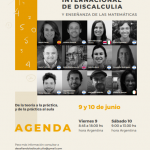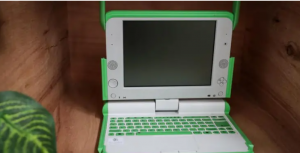Inicio
Who we are

Marcela Mena
Antropóloga, Mag. en Ciencias Cognitivas
Colaboradores Externos
Projects
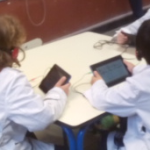
2015 – Classroom interventions to facilitate the learning of math.
To better understand the effects of different stimulation programs we have done small interventions intended to improve the conditions in which children and teenagers learn math. Most of these small interventions are still in process.
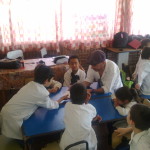
2014 – Estimation games through cards – Facilitating the learning of math.
Once again in this study we test the Approximate Number System’s importance to the development of math competencies but through a deeper stimulation program (20-minute sessions during 15 consecutive days) which is implemented by the teachers. Preliminary results show a significant improvement in math competencies mainly for the group of children whose initial math level (before stimulation) wasn’t neither right nor wrong.
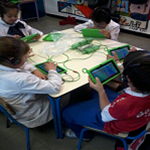
2013 – Playing to estimate – Preparing the learning of math.
From the idea that ANS (Approximate Number System) constitutes the cognitive basis for math we designed an entertainment program to improve ANS precision in 800 children aged 6 using tablets’ games. We checked that the improvement in ANS precision brings about improvements in childrens’ math performance.
Publications
Conference presentations:
Published articles:
- López-Guzman, F., De León, D., Díaz-Simón, N. & Maiche, A. (2022). Development of mathematical cognition: the role of technology in low SES populations. In M.A. Alves, R. Ekuni, M. Hermida & J. Valle Lisboa (Eds.). Cognitive Sciences and Education in Non-WEIRD Populations: A Latin American Perspective. Springer Nature. 10.1007/978-3-031-06908-6.
- Diaz-Simón, N,Cervieri, I., & Maiche, A. (2022). Debates teóricos contemporáneos en Cognición Numérica. Revista Argentina de Ciencias del Comportamiento, 14(3), 15-31.
https://doi.org/10.32348/1852.4206.v14.n3.30236 - Colino, N., & Maiche, A. (2022). Las altas habilidades en el dominio específico de la matemática: una revisión sistemática de los hallazgos empíricos en neurocognición. Cuadernos de Neuropsicología, 16(3), 38-54. DOI: 10.7714/CNPS/16.3.203
- de León, D., Sánchez, I., Koleszar, V., Cervieri, I., & Maiche, A. (2021). Actividades numéricas en el hogar y desempeño matemático en niños preescolares. Revista Argentina De Ciencias Del Comportamiento, 13(3), 49–58.
https://doi.org/10.32348/1852.4206.v13.n3.19928 - Carboni, A., Maiche, A., & Valle-Lisboa, J. C. (2021). Teaching the Science in Neuroscience to Protect From Neuromyths: From Courses to Fieldwork. Frontiers in human neuroscience, 15, 718399.
https://doi.org/10.3389/fnhum.2021.718399.
Media
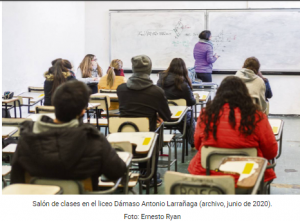
Acompañamientos personalizados,
romper brechas de género y
diagnósticos más tempranos
son claves para mejorar aprendizajes
en matemática
Nota de Infobae, fecha: Entrevista a Alejandro Maiche sobre la tecnología en el aula
Nota en En Perspectiva del 10 de junio de 2019: sobre las sesiones de dirección de los organismos de enseñanza
Nota en El País del 5 de marzo de 2019: sobre “Hay que romper el modelo clásico de escuela
Nota en en Carmelo Portal.com del 17 de setiembre de 2019: sobre Las tecnologías influyen en los procesos de aprendizaje durante la infancia
-
Presentation – “One, two … and? Test!” – TEDxMontevideoED; September, 2014
-
Talk on STEM learning – Academia Brasilera de Ciencias; July, 2015.
Downloads
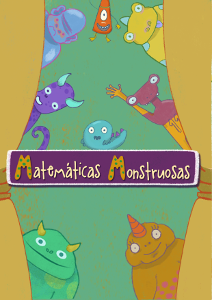
Favoreciendo el aprendizaje de la matemática con la tablet: Juguemos con el tiempo, el espacio y las cantidades
En el marco del proyecto financiado por ANII se desarrollaron materiales que estimulan y favorecen habilidades para la estimación de cantidades, la comparación de magnitudes de tiempo, espacio y cantidad, que sirven de base para la adquisición de la matemática formal.
El libro de Matemáticas Monstruosas contiene actividades pensadas para niños de 2° y 3° año de escuela.
Descargar LibroLa app de Matemáticas Monstruosas incluye 3 mini-juegos diseñado para tablets del Plan Ceibal (Android).
Descargar Juego

PUMA es una plataforma que evalúa las competencias matemáticas tempranas en niños y niñas entre 5 y 7 años que se puede aplicar tanto de forma grupal como individual. Se realiza de forma autoadministrada mediante dispositivos digitales con conexión a internet, tablets, computadoras o incluso teléfonos celulares.










